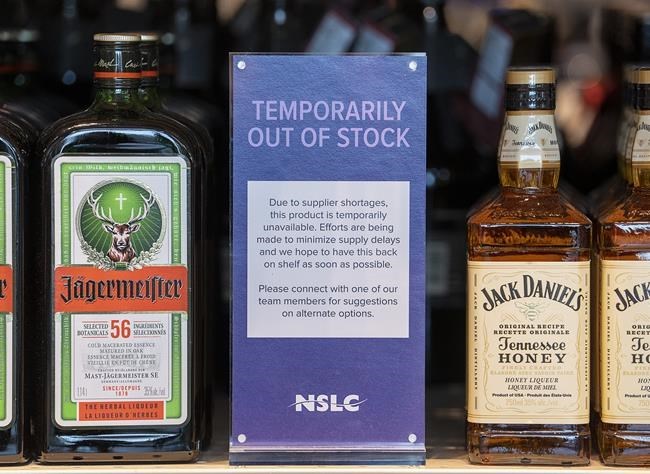Canada is facing alcohol shortages ahead of the holidays due to supply chain issues, a situation prompting some provincial liquor authorities to urge customers to shop early — or be prepared to try a new libation.
Supply chain experts say the inventory crunch stems from issues with production, transportation and demand.
Yet with much of the backlog impacting imported booze, Canadian wineries, distilleries and breweries are encouraging people to buy local.
"Our larders are full," said Carolyn Hurst, chair of the Ontario Craft Wineries and co-owner of Westcott Vineyards. "Every winery in Ontario has lots of product and we're shipping every day. We have no problem getting our product to store shelves."
It's a different story for imported alcohol.
While some types of booze are fully stocked, others varieties are running low or out of stock altogether.
Part of the problem is production. Adverse weather events like fires and droughts have impacted crops in some wine-producing regions.
Labour shortages have also curtailed production of alcohol, especially varieties that are more reliant on manual work.
Production has also been hamstrung by shortages of packaging materials like bottles, screw caps and cans.
"Evolving consumer demand, the availability of raw materials such as glass and aluminum and challenging growing conditions in some areas of the world such as France and New Zealand have impacted some vendors’ production schedules," Nick Nanos, chief supply chain officer for the Liquor Control Board of Ontario, said in a recent statement.
"We encourage customers to shop early this year for the best selection of gifts and holiday favourites, be flexible about choice, and take the opportunity to try something new."
Meanwhile, transportation problems are also impacting booze availability.
A global container shortage, congestion in ports and blank sailings — when a cargo vessel skips or cancels a port of call — have all contributed to inventory backlogs.
"Supply dropped off because of production issues and then there was a huge scarcity of transportation infrastructure," said Saibal Ray, a supply chain management expert and professor in the Bensadoun School of Retail Management at McGill University.
"Wine shipments are even more problematic because they require temperature-controlled containers."
Even once imported liquor arrives in Canada, flooding in British Columbia has curbed road shipping along major trade routes, with Australian and New Zealand wines particularly impacted.
Meanwhile, a pandemic-fuelled rise in demand has only worsened the industry's transportation and production challenges.
Research published last month in the medical journal JAMA Network Open said sales of alcohol soared during the pandemic.
The study found alcohol sales in Canada surpassed pre-pandemic estimates over a 16-month period of the pandemic by 5.5 per cent or $1.86 billion.
One example of an unexpected rise in demand was champagne sales in New Brunswick.
The province recorded an unexpected boom in champagne and sparkling wine sales during the latter half of the pandemic, New Brunswick Liquor Corp. spokeswoman Marie-Andrée Bolduc said.
"This unprecedented increase in demand has unfortunately left us in a situation where we will likely be out of some of our most popular champagnes in the lead up to Christmas," she said in an email.
French brands Veuve Clicquot and Moet & Chandon will be hard to come by in the province, Bolduc said.
The increase in pandemic-era alcohol sales coupled with the usual holiday bump in sales could leave store shelves bereft of some products.
In Nova Scotia, liquor store shelves are already running low on champagnes, scotches, U.S.-produced whisky and some wines from New Zealand, Chile and Argentina.
"We do have ... signs on shelves where we are experiencing shortages that tell customers that the product is temporarily out of stock due to supply shortages," said Beverley Ware, a spokeswoman for the Nova Scotia Liquor Corp. "We recommend alternatives that they can purchase."
While some products aren't available at all, she said in other cases it may be as simple as recommending a different package size — a can as opposed to a bottle or a 12-pack rather than a six-pack.
Saskatchewan is also experiencing alcohol supply chain issues, but continues to have a high availability rate of 96 per cent for the top 500 products sold in the province, said David Morris, a spokesman with the Saskatchewan Liquor & Gaming Authority.
"The main impact has been on products imported through the ports in Vancouver," he said in an email, noting that wine from Australia, New Zealand and South American countries have been most affected.
"Although there are some products currently impacted, customers shopping in both private and public retail stores across the province will continue to have access to a wide variety of beverage alcohol products throughout the busy holiday season."
- With files from Keith Doucette.
This report by The Canadian Press was first published Dec. 11, 2021.
Brett Bundale, The Canadian Press



